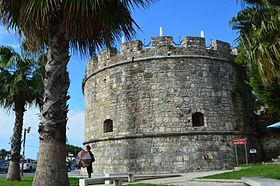Durrës Castle
| Durrës Castle Kalaja e Durrësit |
|
|---|---|
| Durrës, Albania | |

Venetian Tower of Durrës
|
|
| Coordinates | 41°18′35″N 19°26′49″E / 41.3097°N 19.4470°E |
| Site information | |
| Owner |
|
| Controlled by |
The Big Four (World War I) |
| Site history | |
| Built | 1st century BC (final form in 5th century) |
| Built by | final form created by Emperor of the Byzantine Empire Anastasius I Dicorus |
| Battles/wars | Battle of Dyrrhachium (1018), Battle of Dyrrhachium (1081), Battle of Durrës (1939) |
| Events | Miss Shqipëria 2009 |
Durrës Castle (Albanian: Kalaja e Durrësit) is the fortified old city of Durrës, Albania. It is enclosed by city walls built in the late 5th century, and repaired and reinforced in the Middle Ages and early modern periods.
The castle was built by the Byzantine Emperor Anastasius I (r. 491–518), who came from Durrës (ancient Dyrrhachium). At the time, Anastasius made the city one of the most fortified cities on the Adriatic. The ancient walls were devastated in an earthquake in 1273, and had to be extensively repaired.
Currently the medieval walls stand at nearly 15 feet (4.6 meters) in height and the three entrances of some of the fortification towers are preserved in nearly one-third of the original length of the city walls. The castle was reinforced with several guard towers by the Republic of Venice and during the occupation of Albania by the Ottoman Empire the wall was reinforced.
On 7 April 1939, Albanian patriots fought the Italian invasion of Albania. In Durrës, a force of only 360 Albanians, mostly gendarmes and townspeople, led by Abaz Kupi, the commander of the gendarmerie in Durrës, and Mujo Ulqinaku, a marine official, tried to halt the Italian advance. Armed only with small arms and three machine guns, they succeeded in keeping the Italians at bay for several hours until a large number of light tanks disembarked from the latter's naval vessels. After that, resistance diminished and within five hours the Italian forces had captured the entire city.
Today the castle is a popular tourist attraction.
Italian soldiers entering the city on 7 April 1939 after resistance of Mujo Ulqinaku and Royal Albanian Army
...
Wikipedia
